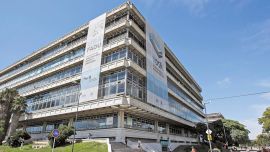The biggest financial asset most provinces have is the governor. If he or she gets on well with whoever happens to be in the Pink House, enough money will come rolling in for much-needed public works to go ahead and for public employees to receive their monthly pay packets on time. If they dislike one another, as sometimes happens, funds are liable to be in short supply.
The same principle applies in the wider world. A president’s international reputation matters greatly. This is certainly true in Argentina’s case. Mauricio Macri’s image as a serious man who, with a bit of help from his friends, could finally manage to turn Argentina into a going concern has already brought in tens of billions of much-needed dollars. Should he get over his current difficulties and somehow or other ram through the structural reforms outsiders think are necessary for the country to prosper, it could eventually be worth many times more.
Unfortunately for Macri, his evident ability to impress foreign grandees who see him as someone they can do business with does not make much of an impression back home. Many people hold his popularity in high places against him. In their view, it merely shows that he has far more in common with members of the wellheeled cosmopolitan jetset that meet in places like Davos than with most of his own compatriots and therefore he should be written off as a cold-hearted plutocrat who cares little for ordinary folk.
That may be grossly unfair, but it is understandable; most people everywhere tend to think in much the same way, and it is hardly surprising that Macri’s political rivals try to make the most of such feelings. Even before he became mayor of Buenos Aires, they did their best to paint him as an out-of-touch rich kid who despised the poor and, far from being willing to lift a finger to help them, would be only too happy to grind them even further into the dirt.
That no doubt is one reason why, on assuming office, Macri’s government immediately made fighting widespread poverty its number one priority and since then has spent far more cash in an attempt to do so than did Mr and Mrs Kirchner’s administration. When Macri decided to take up politics, he knew that to have any chance of success he would have to convince people that, deep down, he was every bit as keen on social justice as any holierthan-thou cleric or self-proclaimed progressive, although unlike some sons and daughters of wealthy parents, he did not go the whole hog by embracing a suitably local version of Marxism. Instead, he adopted capitalism with a human face, an unglamorous creed which, in other parts of the world, has done far more for the poor than any other.
In the view of most European leaders – as well, strange as it may seem, of Donald Trump and Xi Jinping – Macri is fighting populism, the political disease that has kept not only Argentina but also the rest of Latin America bedridden for decades and is now threatening to bring down much of the developed world. Many abroad are evidently under the impression that economic populism as we know it was invented in Argentina by Juan Domingo Perón and Evita, and that unless at long last the country manages to cure itself, it will resume its slide downhill until it ends up like Venezuela, where the annual inflation rate has just roared past 40,000 percent and for millions of people life in a tropical refugee camp is better than what they would have to put up with if they stayed at home.
Luckily for a great many people, especially for the many who voted against him in the 2015 elections, Macri’s success as a fundraiser has so far saved them from such a fate. Things could have been very different. Had Daniel Scioli beat him to the post in the run-off, the country would have found it desperately hard to get its fingers on the enormous amount of money it needed for the Kirchnerite model to keep going for more than a couple of months and would therefore have had to depend on its own resources.
Scioli’s own economic ideas may be much the same as Macri’s, but as most businessmen both here and abroad would have taken it for granted that he was Cristina’s puppet and that, whether he liked it or not, he would have been forced to obey her orders, only a few daring speculators would have shown much interest in trying their luck in a country many thought was about to follow Venezuela down the economic plug-hole.
Macri’s “gradualist” strategy depends on borrowed money. Without it, the government – any government – would find itself ruling a country which was suddenly obliged to live within its means and would therefore have to be subjected to some extremely painful belttightening. Just how a hypothetical president Scioli – or, as by now would be quite likely, a barely imaginable president Carlos Zannini – would have gone about this is anybody’s guess. It may be presumed that, egged on by Cristina and Jorge Bergoglio, it would have blamed everything on the sheer nastiness of “the world” and gone on to organise mass protest rallies in an effort to make people think all their many troubles were due to capitalist savagery. Perhaps it would have authorised looting, nationalised what was still left of the economy and jailed bankers, stuff like that.
In any event, there can be little doubt that a government which would have been unable to get more than a few pennies from the despised markets and was at war with the International Monetary Fund would in all probability have seen Argentina become a wasteland fought over by thuggish bands of political militants. Though it is currently fashionable to laugh at official claims that, had it not been for Team Macri’s efforts, Argentina today would look much like Venezuela, the numbers tell a different story. A considerable proportion of the population is kept afloat by public spending. Were the worst to happen and foreign lenders, accompanied by the IMF, decide to boycott the country, the government would then have to rely completely on whatever the local taxpayers are able to cough up. As a result, many millions who are used to living in comfort would go hungry























Comments